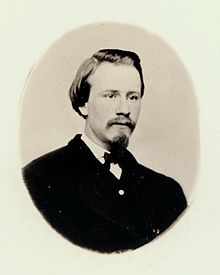John O'Fallon
 |
|
| Born | 1791 |
|---|---|
| Died | December 17, 1865 |
| Allegiance |
|
| Service/branch |
|
| Years of service | 1812—1818 |
| Rank | Captain |
| Unit |
2nd Regiment of Riflemen Regiment of Riflemen |
John O'Fallon (1791 – December 17, 1865) was a businessman, philanthropist, and military officer. During the 19th century he rose to become the wealthiest person in St. Louis, Missouri. He is the namesake of O'Fallon, Illinois, (incorporated in 1874) as well as O'Fallon, Missouri and the nephew of William Clark.
In 1857, he donated over $1 million to establish the O'Fallon Institute at what is now Washington University in St. Louis. O'Fallon's father, James O'Fallon, was a physician who served as a surgeon in Washington's army during the Revolutionary War. After the war he went to Louisville, Kentucky, married Frances Clark, a sister of George Rogers Clark and William Clark, Army officers, who became famous in exploring the Mississippi Valley.
In 1793, when O'Fallon was two and his brother Benjamin was an infant, his father died. According to one source, the boys were sent to St. Louis and raised by their mother's brother, William Clark. Another source says he was raised by his mother. Given the ages of John and Benjamin at the time, it seems possible that when their father died, William Clark offered his sister and her two infant children a permanent home with him in St. Louis.
In 1810, John graduated from college in Lexington, Kentucky.
Following in his father's footsteps, and at the urging of his friends and, probably, of a close family friend, Major Croghan, he entered the army early in the War of 1812. He was assigned to General Harrison's army at Vincennes, Indiana. Promoted to Captain of the Second U.S. Rifle Regiment by March 1814, by May 1815 he commanded this unit.
When the war ended, Congress downsized the army. O'Fallon was one of only four captains it chose to retain. However, on 31 July 1818 he resigned his commission, returned to St. Louis, and secured a post as sutler to the Yellowstone Expedition. The sluggish expedition never reached its destination. When it took two years to even reach Fort Lisa (near present-day Council Bluffs, Iowa), Congress cut its funding. O'Fallon continued as an army sutler in the Council Bluffs area. He freighted his supplies up the Mississippi river in his own boat or boats. In 1820, one of them sank, fully loaded, and nearly wiped him out. St. Louis financial institutions had been hard-hit by the Panic of 1819 and credit was tight, further adding to his financial woes. O'Fallon eventually decided that for him, anyway, the risks weren't worth the potential profit.
...
Wikipedia
